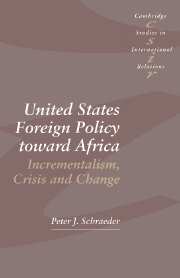Book contents
- Frontmatter
- Contents
- List of tables
- Preface
- Acknowledgments
- List of acronyms
- Maps
- 1 An introduction to US foreign policy toward Africa
- 2 Pattern and process in US foreign policy toward Africa
- 3 US foreign policy toward Zaire
- 4 US Foreign policy toward Ethiopia and Somalia
- 5 US foreign policy toward South Africa
- 6 US Africa policies in the post-Cold War era
- Appendix A Note on method
- Appendix B Note on interview techniques
- Notes
- Select bibliography
- Index
- CAMBRIDGE STUDIES IN INTERNATIONAL RELATIONS
Appendix A - Note on method
Published online by Cambridge University Press: 08 January 2010
- Frontmatter
- Contents
- List of tables
- Preface
- Acknowledgments
- List of acronyms
- Maps
- 1 An introduction to US foreign policy toward Africa
- 2 Pattern and process in US foreign policy toward Africa
- 3 US foreign policy toward Zaire
- 4 US Foreign policy toward Ethiopia and Somalia
- 5 US foreign policy toward South Africa
- 6 US Africa policies in the post-Cold War era
- Appendix A Note on method
- Appendix B Note on interview techniques
- Notes
- Select bibliography
- Index
- CAMBRIDGE STUDIES IN INTERNATIONAL RELATIONS
Summary
An important dilemma confronting scholars in the fields of international relations theory and comparative foreign policy is the critique of policymakers that much of the research in academia either lacks policy relevance or is presented in such a fashion as to be “undigestable” to the policymaker attempting to deal with the day-to-day routine of foreign policy management. For example, whereas policymakers often underscore the need for policy-relevant case studies that recognize that no two cases are exactly alike, and therefore must be informed by the rich detail of history, political scientists, particularly those associated with the behavioral revolution in the social sciences, seek the construction and cumulation of theories which identify pertinent variables and causal patterns, and therefore transcend individual cases and time periods. In short, there exists what has been referred to as a “policy-relevance gap” between the needs of policymakers and the research carried out in academia.
This book seeks to bridge the policy-relevance gap by offering an analysis of US intervention in Africa that responds to the needs and interests of both policymakers within the foreign policy establishment and theorists within the broad fields of comparative foreign policy and international relations theory. The most appropriate method that responds to the policy-relevance gap is that of “structured, focused comparison” of a selected number of well-chosen case studies.
- Type
- Chapter
- Information
- United States Foreign Policy toward AfricaIncrementalism, Crisis and Change, pp. 260 - 262Publisher: Cambridge University PressPrint publication year: 1994

